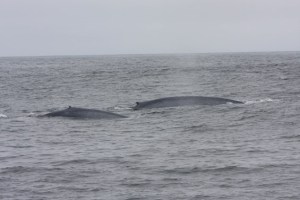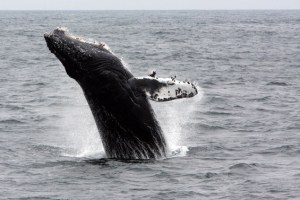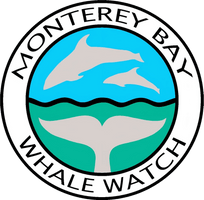AN EXTRAORDINARY NUMBER OF BLUE WHALES AND HUMPBACK WHALES ARRIVE TO MONTEREY BAY
Today, July 5, 2010, both our vessels from Monterey Bay Whale Watch headed out on our regular 9:00 am trip with just over 100 people on holiday to look for whales. We’ve had some great sightings over the last week of humpback whales and hundreds of dolphins so we expected something similar. Instead we were just amazed at the incredible number of blue whales and humpback whales we encountered today near the edge of the Monterey Submarine Canyon. We encountered 28 blue whales and 40 humpback whales and we estimate over 200 whales at a minimum in the area!
Our vessels and crew, the Pt. Sur Clipper with Captain Richard Ternullo and marine naturalist Kate Spencer and the Sea Wolf with myself (Nancy Black) as captain and marine biologist along with marine naturalist Lori Beraha; first encountered three Minke whales just past the Aquarium. The whales were in shallow water feeding on small fish or krill. Minke whales are infrequently seen here and we had incredible looks as they surfaced in flat calm waters in the Bay. The day was begun in an unusual way with the smallest baleen whale and ended with extraordinary sightings of the largest baleen whale.

Richard was the first to spot two blue whales then continued on with reports of 6 more blues in the area. We then arrived to these first blue whales and watched them for over 30 minutes as they circled in the area feeding on krill. While Richard watched more blue whales we continued on and found several groups of humpback whales. As both our boats travelled slowly down the canyon edge spread apart by over 2 miles, we both continued to sight more whales throughout. In fact, there was no period of time where we didn’t have whales in view while we were over the canyon. The numbers of whales and their concentration was exceptional. For example, just within a half-mile in one area we observed 16 humpback whales and 10 blue whales!
After we spent time with the first blue whales and started travelling along the canyon it soon became clear that things had drastically changed over the previous night as we spotted whale blows as far as we could see. We also had reports from other boats in the northern part of the canyon and also to the south near Pt Sur with word of large numbers of whales throughout. Based on that we feel confident that there were likely over 200 whales of both types at a bare minimum in the area today. I recorded 28 blue whales and 40 humpback whales that we observed closely today on our trip alone and I feel that we saw just a small proportion of the total as there were so many blows in the distance that we never got to, as well as reports from other boats covering over 20 miles along the coast.
So what’s really incredible is how all these whales showed up overnight. We do know that blue whales have long-range communication as their low frequency calls can travel hundreds of miles through the oceans. So it seems likely that the whales communicated to others about the food source here or other whales could hear feeding sounds or calls from the whales already here. Some whales could have gathered from more than 50 miles away since yesterday to concentrate in Monterey Bay to consume the krill that was abundant throughout the area. On our depth sounder we could see the krill below our boat and it was most dense from 200′ to the bottom and near the canyon drop-off at around 450′; so that’s over 200′ thick of krill for miles which could be hundreds of tons of krill. The abundance and concentration of krill was just remarkable, proving that indeed the central California coast and Monterey’s Submarine Canyon is a major upwelling zone that supports a tremendous number and variety of marine life from the smallest microplankton to the largest animal to ever live on earth, the blue whale!
 It’s been seven years since we have had good numbers of blue whales feeding in Monterey Bay, and over the last few years blue whale sightings have been few. We were concerned that things had drastically changed off our coast, possibly due to the warming oceans or cyclic changes causing the blue whales to disperse and feed elsewhere. We wondered if that was the new pattern or part of a new cycle; and we missed the blue whales that had always been so predictable in years past. I first began my work in Monterey Bay in 1986, the year the blue whales first showed up in large numbers along our coast, so I always had a special interest in them and even witnessed a stranded blue whale that year and helped with the necropsy when I was in graduate school at Moss Landing Marine Laboratories.
It’s been seven years since we have had good numbers of blue whales feeding in Monterey Bay, and over the last few years blue whale sightings have been few. We were concerned that things had drastically changed off our coast, possibly due to the warming oceans or cyclic changes causing the blue whales to disperse and feed elsewhere. We wondered if that was the new pattern or part of a new cycle; and we missed the blue whales that had always been so predictable in years past. I first began my work in Monterey Bay in 1986, the year the blue whales first showed up in large numbers along our coast, so I always had a special interest in them and even witnessed a stranded blue whale that year and helped with the necropsy when I was in graduate school at Moss Landing Marine Laboratories.
We don’t know how long the blue whales and humpback whales will stay as it depends on the krill which is affected by ocean conditions; currents, temperatures, upwelling conditions and other variables. A blue whale can eat four tons of krill a day or 40 million individual krill; multiply that by 200 whales and that is a massive amount of krill.

What struck me today was the contrast between the exceptionally abundant, healthy and thriving whales in a relatively clean ocean off our coast compared to the disaster in the Gulf where I just feel so sad about the birds and dolphins drenched in oil as they suffer and die in horrible conditions with no clear end in sight. We truly appreciated what we saw today, a bit of nature that gave everyone a good positive feeling and hopefully instilled something about the oceans in our passengers who witnessed this spectacular natural event today in the waters of Monterey Bay.
For people who have always wanted to see blue whales, this may be your year! Check our sightings for daily updates, as we will continue to monitor these whales and post our sightings.
